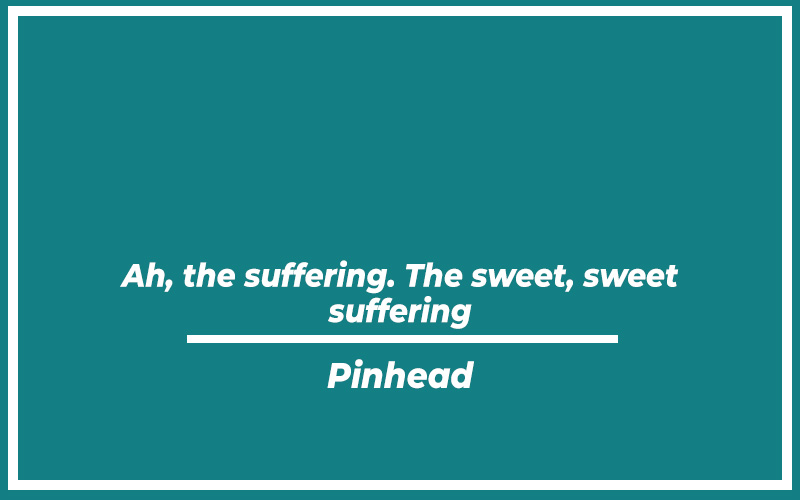If you’re a fan of horror, you’ve probably encountered the chilling presence of Pinhead from the Hellraiser series. This iconic character isn’t your average villain—he’s a master of torment, with a philosophical edge that sets him apart.
When Pinhead speaks, you feel the weight of his dark wisdom, each line dripping with menace and twisted insight. As you explore Pinhead’s world, his quotes will make you think, challenge your fears, and send a shiver down your spine.
Best Pinhead Quotes

“Do I look like someone who cares what God thinks?” – Pinhead
This chilling quote from Pinhead encapsulates his defiance and irreverence towards conventional morality and divine judgment. As a leader of the Cenobites, creatures from an alternate dimension that thrive on human pain and pleasure, Pinhead’s dismissal of divine opinion underscores his embrace of a darker, more nihilistic philosophy.
This line sets the tone for his character, highlighting his distinct otherworldliness and the twisted moral landscape he inhabits, which is defined by the pursuit of extreme sensory experiences, regardless of the moral implications.
Also Read: Bear Quotes (with Explanation)
“Pain has a face. Allow me to show it to you.” – Pinhead
This menacing declaration by Pinhead introduces his unique perception of pain as something tangible and personifiable. As a character, Pinhead represents a boundary between pleasure and pain, making this quote a direct acknowledgment of his role as a torturer who transforms abstract sensations into vivid realities.
It’s a testament to the thematic core of the Hellraiser series, where the exploration of physical and psychological limits through pain defines the encounter with the Cenobites. This quote unnervingly invites the audience to confront the physical manifestation of pain, embodied by Pinhead himself.
“We have such sights to show you!” – Pinhead
Pinhead’s ominous promise is iconic within the horror genre, hinting at the unspeakable horrors that await those who dare to summon the Cenobites. This quote plays on the curiosity and fear of the unknown, enticing with the promise of forbidden knowledge and experiences that are beyond human comprehension.
It encapsulates the allure and terror of the Cenobite world, where the boundaries of experience are pushed beyond ordinary limits, offering a glimpse into the pleasures and pains that are both seductive and horrifying.
“Your suffering will be legendary, even in hell.” – Pinhead
With this foreboding statement, Pinhead conveys the extreme and exceptional nature of the torment he is capable of inflicting. This quote not only reinforces his authority and prowess in the realm of suffering but also serves as a grim warning to those who might underestimate the severity of their fate once ensnared by his powers.
It highlights the theme of eternal punishment and the escalation of horror that defines Pinhead’s character and his interactions with the human world.
“No tears, please. It’s a waste of good suffering.” – Pinhead
In this quote, Pinhead dismisses the human response of crying as futile in the face of the inevitable agony that his presence promises. This line reflects his cold, sadistic nature and his philosophical view that suffering is a substantive, valuable experience to be savored rather than wasted on emotional displays.
It underscores the twisted ethos of the Cenobites, who derive meaning and existence from the exploration and administration of pain, viewing it as an art form rather than a cause for pity.
“Explorers in the further regions of experience. Demons to some. Angels to others.” – Pinhead
This self-description by Pinhead elucidates the dual nature of the Cenobites’ existence and mission. They are explorers of extreme sensory experiences, occupying a niche that is both angelic and demonic, depending on the perspective of those they encounter.
This quote captures the ambiguous morality of the Cenobites, who are neither purely evil nor benevolent but are creatures with a complex mandate that transcends human moral judgments, fascinated with the limits of human experience.
“The box. You opened it. We came.” – Pinhead
This simple yet ominous quote from Pinhead addresses the consequences of human curiosity and the irreversible actions that lead to the Cenobites’ arrival. The box, or the Lament Configuration, is a puzzle that, once solved, opens a gateway to their dimension.
Pinhead’s statement is a stark reminder of the pact that comes with seeking out and tampering with forces beyond human understanding, highlighting themes of temptation, punishment, and the inevitable repercussions of one’s actions in the Hellraiser universe.
“Go on… but trick us again child, and your suffering will be legendary.” – Pinhead
This quote reveals Pinhead’s menacing nature and his control over the realm of suffering. His warning is a chilling reminder of the consequences that follow deceit or failure to abide by the rules he governs. It emphasizes the blend of temptation and threat that Pinhead represents, offering a choice that is fraught with peril.
This line underscores the sinister authority of the Cenobites and their unforgiving nature, highlighting the precarious balance that characters must navigate when dealing with forces that are far beyond human understanding.
“What you think of as pain is a shadow. Pain has a face. Allow me to show it to you. Gentlemen, I am pain.” – Pinhead
Pinhead’s declaration as the embodiment of pain itself magnifies his role as not just a purveyor of physical torment but as its personification. This quote intensifies the horror associated with his character, suggesting that what one normally understands as pain is merely a prelude to the true, profound suffering he can inflict.
It serves to elevate the terror to a philosophical level, where Pinhead is not merely a character but a fundamental force of nature within the universe of Hellraiser, embodying an essential aspect of human fear and fascination.
“I am the way.” – Pinhead
With this assertive declaration, Pinhead positions himself as a guide or gatekeeper to the hidden truths of existence, drawing a dark parallel to religious saviors who promise enlightenment and salvation.
This quote, however, twists that promise into a sinister pledge of revelation through suffering. It’s a proclamation that the path he offers leads to a deeper understanding of one’s own limits and capacities through the experience of pain, framing him as an essential passage to forbidden knowledge and transcendental experiences in the Hellraiser mythology.
“Demons aren’t made, they’re born.” – Pinhead
This statement by Pinhead explores the nature of evil and the essence of the Cenobites. By suggesting that demons are born, not made, Pinhead implies that their nature is inherent and immutable, rather than a product of external circumstances.
This view of demonic existence challenges the notion of choice and redemption, proposing a predetermined path that aligns with the themes of fate and destiny prevalent in horror genres. It adds a layer of fatalism to the character of Pinhead, enhancing his mythos as a being intrinsically tied to the darker aspects of the universe.
“We’ll tear your soul apart.” – Pinhead
This grim promise from Pinhead underscores the brutal, relentless nature of the Cenobites’ interventions in human lives. It’s not just physical pain that Pinhead inflicts; his true terror lies in the ability to dismantle the very essence of a person, their soul.
This line encapsulates the existential threat that Pinhead represents, highlighting his role as an agent of profound personal transformation—albeit agonizing and destructive. It speaks to the core of the Hellraiser narrative, where engagement with the Cenobites leads to irrevocable change.
“You may think I’m merely a twisted being, exploiting the dark sides of human nature, but I am merely a servant.” – Pinhead
In this reflective statement, Pinhead provides insight into his own perception of his existence. He sees himself not as a malevolent force acting of his own volition but as a servant to a greater, albeit darker, purpose.
This quote adds depth to his character, suggesting a resignation to his role in the cosmic order of the Hellraiser universe. It invites the audience to reconsider their understanding of Pinhead, not just as a villain but as a complex figure bound to his duties of exploring and exploiting the human psyche.
“There is no good and evil, there is only flesh.” – Pinhead
This quote highlights Pinhead’s philosophical outlook on the irrelevance of moral dichotomies in the face of primal, physical reality. By reducing everything to the concept of flesh, Pinhead dismisses traditional moral judgments and focuses on the corporeal experience as the fundamental aspect of existence.
This perspective is central to the Hellraiser series, where the exploration of physical limits through pain and pleasure blurs the lines between suffering and indulgence, challenging viewers to confront their own values and boundaries regarding the physical self.
“No tears, please. It’s a waste of good suffering.” – Pinhead
In this chilling remark, Pinhead dismisses human tears as futile, emphasizing his perception of suffering as a valuable experience. This line underscores the Cenobites’ twisted philosophy, where pain is not merely endured but savored. By deeming tears a “waste,” Pinhead reveals a disdain for emotional responses that detract from the purity of agony.
This perspective challenges conventional views on pain, presenting it as an art form to be fully embraced rather than a condition to be alleviated. The quote encapsulates the perverse allure of the Cenobite realm, where suffering is both a means and an end.
“We have such sights to show you!” – Pinhead
This ominous promise from Pinhead entices with the allure of forbidden experiences. The “sights” refer to the unimaginable horrors and pleasures that await those who engage with the Cenobites. The line serves as both an invitation and a warning, highlighting the seductive danger of exploring beyond mortal limits.
It encapsulates the central theme of the Hellraiser series: the perilous pursuit of ultimate experiences that blur the line between ecstasy and torment. Pinhead’s declaration lures individuals into a realm where curiosity leads to irreversible consequences, emphasizing the cost of seeking forbidden knowledge.
“Your suffering will be legendary, even in Hell.” – Pinhead
Pinhead’s assertion elevates the impending torment to a status of infamy. By stating that the suffering will be “legendary,” he implies an intensity that surpasses ordinary pain, resonating even in the depths of Hell. This line serves to instill profound dread, suggesting that the victim’s agony will be unparalleled and eternal.
It reflects the Cenobites’ capacity to inflict suffering that transcends human comprehension, reinforcing their role as arbiters of extreme experiences. The quote underscores the irreversible and monumental nature of the torment awaiting those who encounter Pinhead.
“Explorers in the further regions of experience. Demons to some. Angels to others.” – Pinhead
This self-description reveals the duality of the Cenobites’ existence. As “explorers,” they traverse the boundaries of sensation, seeking to expand the realms of experience. Their perception as “demons” or “angels” depends on individual perspectives: to some, they are harbingers of pain; to others, they offer transcendental experiences.
This ambiguity challenges binary notions of good and evil, presenting the Cenobites as complex entities beyond conventional morality. The quote encapsulates the enigmatic allure of the Cenobites, whose actions defy simple categorization, reflecting the subjective nature of pleasure and pain.
“The box. You opened it. We came.” – Pinhead
This statement underscores the cause-and-effect relationship between human curiosity and the Cenobites’ arrival. The “box” refers to the Lament Configuration, a puzzle that, when solved, summons the Cenobites. Pinhead’s matter-of-fact tone highlights the inevitability of their appearance once the box is opened, serving as a cautionary reminder of the consequences of seeking forbidden knowledge.
The quote emphasizes the theme of curiosity leading to peril, a central motif in the Hellraiser series, where the desire to explore unknown realms results in encounters with unimaginable horrors.
“Do I look like someone who cares what God thinks?” – Pinhead
In this defiant retort, Pinhead dismisses divine judgment, asserting his autonomy from religious morality. The rhetorical question challenges the authority of God, highlighting Pinhead’s role as a being beyond human ethical constraints.
This line reflects the Cenobites’ indifference to conventional notions of good and evil, operating instead within their own framework of pleasure and pain. It underscores the otherworldly nature of Pinhead, who exists outside the bounds of human religious constructs, emphasizing the alien morality that governs the Cenobite realm.
“We’ll tear your soul apart.” – Pinhead
This terrifying promise encapsulates the ultimate violation the Cenobites intend to inflict. By targeting the “soul,” Pinhead indicates a torment that transcends physical pain, aiming to destroy the very essence of an individual. The use of “tear” conveys a brutal, violent process, emphasizing the severity of the suffering.
This line serves as a grim warning of the irreversible and profound agony that awaits those who encounter the Cenobites, highlighting their role as agents of ultimate destruction. It reinforces the existential horror central to the Hellraiser narrative, where the stakes involve the annihilation of one’s very being.

“Ah, the suffering. The sweet, sweet suffering.” – Pinhead
In this line, Pinhead expresses a perverse appreciation for human agony, highlighting the Cenobites’ twisted perception of pain as a form of pleasure. This perspective challenges conventional understandings of suffering, presenting it as an experience to be savored rather than avoided.
The repetition of “sweet” emphasizes the depth of this perversion, underscoring the alien nature of the Cenobites’ desires. This quote encapsulates the central theme of the Hellraiser series: the exploration of the fine line between pain and pleasure, and the horrors that lie in their intersection.
“It is not hands that summon us. It is desire.” – Pinhead
Pinhead’s statement reveals that the Cenobites are drawn not by the physical act of opening the puzzle box, but by the summoner’s underlying desire. This insight shifts the focus from mere curiosity to the deeper, often darker, yearnings that compel individuals to seek out the box.
It suggests that the true catalyst for the Cenobites’ arrival is the summoner’s intent, emphasizing the power of human desire in transcending boundaries and summoning forces beyond comprehension. This quote underscores the theme of forbidden longing and its consequences, central to the Hellraiser narrative.
“Just give me the box and I’ll free you from the future.” – Pinhead
In this line, Pinhead offers a Faustian bargain, promising liberation from the uncertainties of the future in exchange for the puzzle box. This proposition plays on human fears and desires for control over destiny, tempting individuals to surrender to the Cenobites’ dominion.
It reflects the manipulative nature of Pinhead, who exploits vulnerabilities to achieve his ends. The quote highlights the recurring theme of temptation and the perilous deals made with otherworldly entities, a hallmark of the Hellraiser series.
“Time to play.” – Pinhead
This succinct declaration signals the commencement of the Cenobites’ tormenting rituals. The use of the word “play” is deeply ironic, as it trivializes the impending horrors, framing them as a form of entertainment. This choice of language reflects the Cenobites’ detachment from human suffering, viewing it as a mere pastime.
The quote serves to heighten the terror, as it contrasts the gravity of the situation with the casualness of the Cenobites’ perspective, emphasizing their alien and sadistic nature.
“Do I look like someone who cares about rules?” – Pinhead
In this defiant retort, Pinhead dismisses the notion of adhering to conventional rules, asserting his autonomy and disdain for human-imposed limitations. This line underscores his role as a chaotic force, unbound by societal norms or ethical constraints.
It highlights the unpredictability and danger inherent in interactions with the Cenobites, who operate beyond the realm of human law and order. The quote reinforces the theme of transgression and the breaking of taboos, central to the Hellraiser series.
“I am the way.” – Pinhead
This proclamation positions Pinhead as a guide or gatekeeper to forbidden experiences and knowledge. The phrase echoes religious connotations, subverting them to present a path leading not to salvation, but to damnation and enlightenment through suffering. It reflects the Cenobites’ role in offering transcendence via extreme sensations, challenging traditional moral dichotomies.
The quote encapsulates the allure and danger of seeking experiences beyond mortal comprehension, a core theme in the Hellraiser narrative.
“What you think of as pain is a shadow. Pain has a face. Allow me to show it to you.” – Pinhead
In this chilling invitation, Pinhead redefines the concept of pain, suggesting that human understanding of it is superficial. By personifying pain, he implies a deeper, more intimate experience that he can reveal.
This line serves to unsettle, as it challenges the audience’s perceptions and foreshadows the unimaginable horrors the Cenobites can inflict. It underscores the series’ exploration of the boundaries of sensation and the unknown depths of suffering, central to the Hellraiser mythos.
Also Read: Lash Quotes (with Explanation)
Final Thoughts
Pinhead’s quotes are more than just horror movie lines—they’re a deep dive into the dark corners of human desire and consequence.
They leave you questioning what you’d be willing to endure in the pursuit of your deepest wants.
As you reflect on these chilling words, let them remind you of the fine line between pleasure and pain, and the cost of exploring forbidden paths. Whether they terrify or intrigue you, Pinhead’s quotes are unforgettable, much like the character himself.

